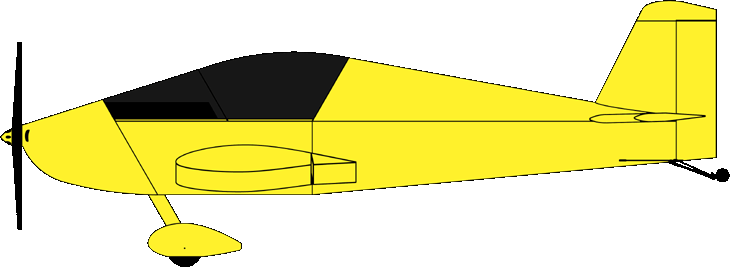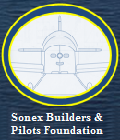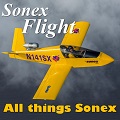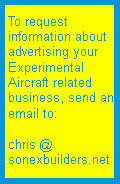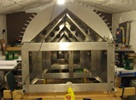

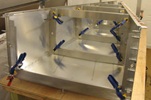
random user submitted photo
Fuel Line
9 posts
• Page 1 of 1
Fuel Line
I'm looking for advice and also thoughts regarding fuel line. I had a thought that use of the aluminum line from tank to the firewall is rigid. Would not vibration over time cause possible loosening of the molded tank fittings? I wonder if use of fuel line hose would not be a better option allowing for more route possibilities and nil vibration? Thanks for input in advance.
Rutter
N374WR (Reserved)
Sonex tri-gear
Polish
Aerovee
N374WR (Reserved)
Sonex tri-gear
Polish
Aerovee
- Sonex374
- Posts: 27
- Joined: Sun Aug 11, 2013 7:12 am
- Location: Wisconsin
Re: Fuel Line
I would tend to agree with your assessment about vibration over time being a possible problem causing a leak at the fittings and having just installed a hard line from the tank to the fuel valve on the fire wall in my case,I am rethinking my decision .
I installed a fuel valve on the firewall to avoid having movement at the tank fitting every time you turn the valve on or off,but never gave any thought to the connection between the firewall and the tank.
Good call :idea:
Mike
I installed a fuel valve on the firewall to avoid having movement at the tank fitting every time you turn the valve on or off,but never gave any thought to the connection between the firewall and the tank.
Good call :idea:
Mike
Mike
I know but one freedom, and that is the freedom of the mind.
Antoine de Saint-Exupery
Onex 080 now flying,Hummel 85HP ,Tri gear,GRT Mini X EFIS,and EMS,iFly 740 GPS
I know but one freedom, and that is the freedom of the mind.
Antoine de Saint-Exupery
Onex 080 now flying,Hummel 85HP ,Tri gear,GRT Mini X EFIS,and EMS,iFly 740 GPS
-

Mike53 - Posts: 486
- Joined: Mon Jun 20, 2011 10:00 pm
- Location: Dutton,Ontario , Canada
Re: Fuel Line
Would not vibration over time cause possible loosening of the molded tank fittings?
That's exactly why I have just fitted a flexible fuel hose between the tank and the firewall. Brass fittings through the firewall, then sleeved flexible lines from then on. All the other tank fittings I have just plugged.
That's exactly why I have just fitted a flexible fuel hose between the tank and the firewall. Brass fittings through the firewall, then sleeved flexible lines from then on. All the other tank fittings I have just plugged.
Phil Bird
Sonex 759 JAB 2.2 Tailwheel
Mittagong NSW Australia
http://www.mykitlog.com/corby202/
https://www.flickr.com/photos/78427482@ ... otostream/
Sonex 759 JAB 2.2 Tailwheel
Mittagong NSW Australia
http://www.mykitlog.com/corby202/
https://www.flickr.com/photos/78427482@ ... otostream/
- Corby202
- Posts: 223
- Joined: Mon Dec 30, 2013 2:08 am
Re: Fuel Line
I use aluminium tube from the tank to the fuel valve mounted on the firewall, then through a bulkhead fitting to the gascolator. So far no problems for 5 years. In an attempt to reduce the amount of vibration, the fuel valve Is mounted to the centre square tube, Gascolator bracket is welded to the engine mount. Neither mounted on the shaky stainless firewall.
Also still have all the original tank fittings in the tank. I think if using solid tubing to the main tank don't make it a straight piece. Put a couple of bends in the tube. It will allow minor adjustments to be made while fitting, and ensure there is no strain on the fittings.
I wonder if the standard fuel valve (something that needs to be fiddled with twice per flight), mounted to the tank could be one issue with these frequent tank fitting failures?
Steve
Sonex 892
Also still have all the original tank fittings in the tank. I think if using solid tubing to the main tank don't make it a straight piece. Put a couple of bends in the tube. It will allow minor adjustments to be made while fitting, and ensure there is no strain on the fittings.
I wonder if the standard fuel valve (something that needs to be fiddled with twice per flight), mounted to the tank could be one issue with these frequent tank fitting failures?
Steve
Sonex 892
- sonex892
- Posts: 169
- Joined: Fri Jun 03, 2011 4:49 am
- Location: Port Macquarie Australia
Re: Fuel Line
On the flip side of the argument for flexible line from tank valve to firewall, that valve is heavy, and add the weight of the line and you have a cantilevered unsupported weight that may see 6 G downward load. (may be okay if you never bounce a landing :-) The rigid tube at least helps support the valve by making the valve and tube a rigid structure between tank and firewall.
As to operating the valve. It is easy to make a bracket that clamps to valve body to hold a push pull cable to panel knob. Advantages are valve position instantly visible, and easily reached in an emergency with shoulder belts tight.
David A. Sonex TD, CAMit 3300
As to operating the valve. It is easy to make a bracket that clamps to valve body to hold a push pull cable to panel knob. Advantages are valve position instantly visible, and easily reached in an emergency with shoulder belts tight.
David A. Sonex TD, CAMit 3300
- DCASonex
- Posts: 935
- Joined: Mon Sep 12, 2011 8:04 pm
- Location: Western NY USA
Re: Fuel Line
I would agree with David's comment on the flexible fuel line potentially causing more load / strain on the tank fittings in either case - shock loads (from a hard landing or maneuver) or resonant vibration. In a simple mass/spring/damper scenario, the less stiff hose will deflect more than the comparatively rigid tubing. This will likely cause more strain damage to the tank fitting than a tube that will only resonate at a much higher frequency or harmonic of that frequency. Combustion engines make lots of resonances due to engine orders, so worst case is the rigid fuel tubing going into resonance at cruise RPM. This means that the tubing is vibrating at its largest amplitude and causing the most stress on the tank fitting it can create. The odds of this 'perfect storm' are not likely, but certainly possible. More likely is that it does go through at least one resonance as the engine changes from idle to full power and back to cruise. The trick is to not let it live there. If you really want to know if / when it resonates, you have to watch it with a strobe light while matching engine RPM or use an accelerometer and related hardware to record it. The solution I'm choosing is the rigid tubing with some soft damper pads on the firewall to minimize total tube deflection to reduce strain on the ends (constraints).
Sean
Sean
Sonex N857SX
AeroVee, Taildragger, Dual Stick
AeroVee, Taildragger, Dual Stick
- achesos
- Posts: 33
- Joined: Tue Sep 22, 2015 9:19 pm
- Location: Delavan, Wisconsin
Re: Fuel Line
achesos wrote:I would agree with David's comment on the flexible fuel line potentially causing more load / strain on the tank fittings in either case - shock loads (from a hard landing or maneuver) or resonant vibration. In a simple mass/spring/damper scenario, the less stiff hose will deflect more than the comparatively rigid tubing. This will likely cause more strain damage to the tank fitting than a tube that will only resonate at a much higher frequency or harmonic of that frequency. Combustion engines make lots of resonances due to engine orders, so worst case is the rigid fuel tubing going into resonance at cruise RPM. This means that the tubing is vibrating at its largest amplitude and causing the most stress on the tank fitting it can create. The odds of this 'perfect storm' are not likely, but certainly possible. More likely is that it does go through at least one resonance as the engine changes from idle to full power and back to cruise. The trick is to not let it live there. If you really want to know if / when it resonates, you have to watch it with a strobe light while matching engine RPM or use an accelerometer and related hardware to record it. The solution I'm choosing is the rigid tubing with some soft damper pads on the firewall to minimize total tube deflection to reduce strain on the ends (constraints).
Sean
I appreciate your well explained reasoning and while I agree with your assessment that the rigid line would probably pose less strain on the tank fittings but only because you are keeping the valve attached to the tank,and as Dave said that valve is heavy and would benefit from the rigid line by dampening movement of the valve.
My argument is based on moving the valve to the firewall which I have done .Now the flexible line will transfer very little vibration to the fitting at the tank.Restraining it's movement without making it rigid would complete the package.
I'm no engineer but common sense tells me that the heavy valve acting on the tank fitting is a problem and even with the rigid tubing it will be under extreme strain in certain scenario's,hard landings etc.It wouldn't be that big an issue if the tank were metal but that's not an option.
Anything I say is bunk unless you agree,in which case maybe a second opinion would be appropriate :mrgreen:
Mike
Mike
I know but one freedom, and that is the freedom of the mind.
Antoine de Saint-Exupery
Onex 080 now flying,Hummel 85HP ,Tri gear,GRT Mini X EFIS,and EMS,iFly 740 GPS
I know but one freedom, and that is the freedom of the mind.
Antoine de Saint-Exupery
Onex 080 now flying,Hummel 85HP ,Tri gear,GRT Mini X EFIS,and EMS,iFly 740 GPS
-

Mike53 - Posts: 486
- Joined: Mon Jun 20, 2011 10:00 pm
- Location: Dutton,Ontario , Canada
Re: Fuel Line
Mike,
I agree moving the valve from the tank and putting only flexible line to the tank is a viable way to reduce stress on tank fitting. That approach also provides opportunity to leave a bit of slack in the line so that an overly hard landing, or worse, does not pull that line free. Hope you are also planning a remote operator for that valve. Might want to shut it off in event of imminent emergency landing and that is not the time to loosen shoulder belts and go fishing for it. Remote operator can also provide instant verification of the valve's position to insure it has not been kicked partly off.
David A. Sonex TD, CAMit 3300
I agree moving the valve from the tank and putting only flexible line to the tank is a viable way to reduce stress on tank fitting. That approach also provides opportunity to leave a bit of slack in the line so that an overly hard landing, or worse, does not pull that line free. Hope you are also planning a remote operator for that valve. Might want to shut it off in event of imminent emergency landing and that is not the time to loosen shoulder belts and go fishing for it. Remote operator can also provide instant verification of the valve's position to insure it has not been kicked partly off.
David A. Sonex TD, CAMit 3300
- DCASonex
- Posts: 935
- Joined: Mon Sep 12, 2011 8:04 pm
- Location: Western NY USA
Re: Fuel Line
Thanks David.
Scroll to bottom of this page to see the valve selector at lower panel in red. http://www.onexmike.org/fuel-system.html
Mike
Scroll to bottom of this page to see the valve selector at lower panel in red. http://www.onexmike.org/fuel-system.html
Mike
Mike
I know but one freedom, and that is the freedom of the mind.
Antoine de Saint-Exupery
Onex 080 now flying,Hummel 85HP ,Tri gear,GRT Mini X EFIS,and EMS,iFly 740 GPS
I know but one freedom, and that is the freedom of the mind.
Antoine de Saint-Exupery
Onex 080 now flying,Hummel 85HP ,Tri gear,GRT Mini X EFIS,and EMS,iFly 740 GPS
-

Mike53 - Posts: 486
- Joined: Mon Jun 20, 2011 10:00 pm
- Location: Dutton,Ontario , Canada
9 posts
• Page 1 of 1
Who is online
Users browsing this forum: No registered users and 75 guests
